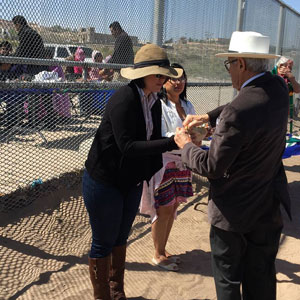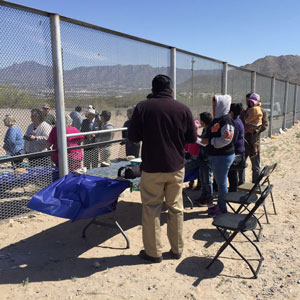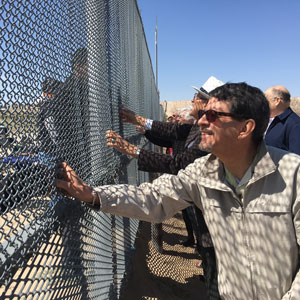A letter from Amanda Craft serving as Regional Liaison for Mexico and Guatemala and Omar Chan serving on the U.S./Mexico border
June 2016
Write to Amanda Craft
Write to Omar Chan
Individuals: Give online to E200512 for Amanda Craft’s and Omar Chan’s sending and support
Congregations: Give to D507508 for Amanda Craft’s and Omar Chan’s sending and support
Churches are asked to send donations through your congregation’s normal receiving site (this is usually your presbytery).
Lent and Easter was a time filled with much activity and moments for reflection. As part of the first week of Lent, Rev. Jessica Vaughn Lower, pastor of Grace Presbyterian Church in El Paso, Texas, reflected on regret. Lent, she said, is meant to be a time in which we reflect on regret and the sadness and disappointment that comes with it. Regret comes due to a direct action we took or did not take. Too many times we dismiss regret as something we went through to get us to this new and better place. Jessica emphasized that if we take the time to focus on our regret—what we threw away, what we missed, what we lost—we can take an important opportunity to be changed and transformed. It is our responsibility to own the pain and sadness we caused and felt. It is also our responsibility to learn and grow from the experience. Regret invites us to seek change. This has been an important lesson for us during this Lenten season and acknowledged during a delegation visit.

Serving communion
In March we were blessed by a visit from the Synod of the Southwest. They held their meeting in El Paso in order to show solidarity with sisters and brothers who live south of the U.S./Mexico border. We were invited to help plan a binational communion service at the border wall with our Mexican partners who are part of the Pasos de Fe ministry site. The act of communion together was a significant way to show solidarity and to extend the image of family.
The communion service was set for Saturday morning, March 19, at the Anapra Crossing in nearby Anapra, New Mexico. Anapra Crossing holds historic significance for the three-way state connection of New Mexico, Texas, and Chihuahua, Mexico. Before the border was so heavily controlled, people freely crossed at this site, especially because here they did not have to cross the Rio Grande. In recent years, this location was highly affected by the spike in violence fueled mostly by drug cartels. Many Mexicans tell the story that police did not even enter this community because of its volatile nature. Today a chain-link fence divides New Mexico and Mexico and marks the Anapra Crossing. The community on the southern side of the fence is slowly recovering as it still struggles with economic viability and security. However, this spot has become an important location for families and loved ones to meet each other, to touch each other between the links in the fence, and to be present with one another. It was the ideal location for a binational communion service.

South side of fence and border
Those of us from the United States arrived 1.5 hours late due to unexpected road construction and traffic blocked by accidents. We felt like we were back in Latin America. Miraculously our partners were there waiting patiently. In midst of the wind, chilly temperatures and dust they stood on the other side of the fence, pleased to see us. As we set up for the service, people tenderly exchanged greetings through the fence. They shook hands as they could and extended blessings.
The U.S. Border Patrol was also waiting our arrival. They monitored our presence, but not once did they interrupt. As we interacted with them, they only extended concern for our safety and asked that we respect protocol about passing things through or climbing the fence. The Mexican authorities were present on either side of the fence as well. They, too, respected our space and right to express our faith publically.
Reverends Jose Olagues and Joseph Keesecker officiated the service. We sang together, we prayed together, we listened to and pondered scripture together. We talked about the artificial fences or divisions our nations put up. As people of faith, however, we understand that our connections transcend those fences. Our common faith allows us to enjoy the larger family God calls us to be.

Serving communion
Communion was officiated in Spanish, and our Mexican brothers and sisters participated simultaneously. Melissa Navarrette Ocampo, Young Adult Volunteer at the Tucson site working along the U.S./Mexico border, and Amanda were asked to serve communion. It was magical to see two women serve communion as dust gathered at our feet. Amanda reflected, “It was the first time I was able to serve communion using both English and Spanish. My worlds had come together in that one moment.” The intergenerational event also included our children as well as those of our Mexican partners. They ran around playing soccer on the margins, enjoying the space outside as they were in God’s presence. In spite of very worldly frustrations of time and need to control, the service was a precious reflection of what God truly intends for God’s family.
Returning to the feeling of regret, we regret that we could not plan around the unforeseen hiccups in our day. We regret that our nations’ policies keep us from being able to be fully present with each other to celebrate the goodness God brings.

Saying Farewell
However, we experienced something beyond our own regrets. We can transcend the rules and regulations that keep us divided. We can choose to not be overwhelmed by those things out of our control. We can enjoy fully the moments the Divine shines through, illuminated by those in our presence. We must celebrate moments when we can live in the midst of those regrets. We were moved and transformed by both partners’ commitment to participate in this significant moment. Love would not be hindered by what could easily have been thwarted by fear or hate.
We ended the service in song and in farewells. Again we approached the fence to share blessings with our partners. Gratitude and respect floated through the air on both sides of the fence. God is good.
These moments when we see and experience God’s presence in a transformative way happen because you choose to be a part of this ministry. Your support allows these moments to happen. We invite you to continue to pray for us as we accompany people along the U.S./Mexico border, and those further south. We invite you to also consider a commitment to additional financial support if you feel called to do so. Our work is an extension of God’s ministry in the world. Thank you for being a part of it.
Amanda and Omar
![]() You may freely reuse and distribute this article in its entirety for non-commercial purposes in any medium. Please include author attribution, photography credits, and a link to the original article. This work is licensed under a Creative Commons Attribution-NonCommercial-NoDeratives 4.0 International License.
You may freely reuse and distribute this article in its entirety for non-commercial purposes in any medium. Please include author attribution, photography credits, and a link to the original article. This work is licensed under a Creative Commons Attribution-NonCommercial-NoDeratives 4.0 International License.